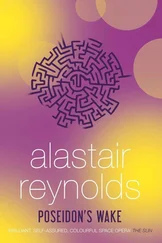She fingered the unmarked pages. Her argument was not yet completed, but she could already see the trajectory it would take. She could almost see the words and figures on the pages, spectrally faint but needing only time and concentration to bring them into sharp focus. On a journey as long as the one she planned to take, there would surely be many opportunities to work on her book.
But she couldn’t take it. The book meant too much to her, and she could not bear the thought of losing it or having it stolen. At least if she left it here it would be safe until her return. She could still take notes while she was away, after all, refining her argument, ensuring that the edifice came together with no obvious flaws or weaknesses. The book would be all the stronger for it.
Rashmika clasped it shut, pushed it aside.
That left two things. One was her compad, the other a scuffed and dirty toy. The compad did not even belong to her, really; it was the family’s, and she only had it on extended loan while no one else needed it. But as no one had asked for it for months, it was unlikely to be missed during her absence. In its memory were many items relevant to her study of the scuttlers, sourced from other electronic archives. There were images and movies she had made herself, down in the digs. There were spoken testimonies from miners who had found things that did not quite accord with the standard theory of the scuttler extinction, but whose reports had been suppressed by the clerical authorities. There were texts from older scholars. There were maps and linguistics resources, and much that would guide her when she reached the Way.
She picked up the toy. It was a soft, pink thing, ragged and faintly pungent. She had had it since she was eight or nine, had picked it herself from the stall of an itinerant toymaker. She supposed it must have been bright and clean then, but she had no memory of the toy ever being anything other than well loved, grubby with affection. Looking at it now with the rational detachment of a seventeen-year-old, she had no idea what kind of creature the toy had ever been meant to represent. All she knew was that from the moment she saw it on the stall she had decided it was a pig. It didn’t matter that no one on Hela had ever seen a living pig.
“You can’t come with me either,” she whispered.
She picked up the toy and placed it atop the book, squeezing it down until it sat like a sentry. It wasn’t that she did not want it to come with her. She knew it was just a toy, but she also knew that there would be days ahead when she would feel terribly homesick, anxious for any connection to the safe environment of the village. But the compad was more useful, and this was not a time for sentiment. She pushed the dark slab into the bag, drew tight the bag’s vacuum seal and quietly left her room.
Rashmika had been fourteen when the caravans had last come within range of her village. She had been studying then and had not been allowed to go out to see the meeting. The time before that, she had been nine: she had seen the caravans then, but only briefly and only from a distance. What she now remembered of that spectacle was inevitably coloured by what had happened to her brother. She had replayed those events so many times that it was quite impossible to separate reliable memory from imagined detail.
Eight years ago, she thought: a tenth of a human life, by the grim new reckoning. A tenth of a life was not to be underestimated, even if eight years would once have been a twentieth or a thirtieth of what one could expect. But at the same time it felt vastly more than that. It was half of her own life, after all. The wait until she could next see the caravans had felt epochal. She really had been a little girl the last time she had seen them: a little girl from the Vigrid badlands with a reputation, however strange, for always telling the truth.
But now her chance had come again. It was near the hundredth day of the hundred and twenty-second circumnavigation that one of the caravans had taken an unexpected detour east of Hauk Crossing. The procession had veered north into the Gaudi Flats before linking up with a second caravan that happened to be heading south towards Glum Junction. This did not happen very often: it was the first time in nearly three revolutions that the caravans had come within a day’s travel of the villages on the southern slopes of the Yigrid badlands. There was, naturally, a great deal of excitement. There were parties and feasts, jubilation committees and invitations to secret drinking dens. There were romances and affairs, dangerous flirtations and secret liaisons. Nine months from now there would arrive a clutch of wailing new caravan babies.
Compared with the general austerity of life on Hela and the particular hardships of the badlands, it was a period of measured, tentative hope. It was one of those rare times when—albeit within tightly prescribed parameters—personal circumstances could change. The more sober-minded villagers did not allow themselves to show any visible signs of excitement, but privately they could not resist wondering if this was their turn for a change of fortune. They made elaborate excuses to allow themselves to travel out to the rendezvous point: excuses that had nothing to do with personal gain, but everything to do with the communal prosperity of the villages. And so, over a period of nearly three weeks, the villages sent out little caravans of their own, crossing the treacherous scabbed ground to rendezvous with the larger processions.
Rashmika had planned to leave her home at dawn, while her parents were still sleeping. She had not lied to them about her departure, but only because it had never been necessary. What the adults and the other villagers did not understand was that she was as capable of lying as any of them. More than that, she could lie with great conviction. The only reason why she had spent most of her childhood not lying was because until very recently she had failed to see the point in it.
Quietly she stole through the buried warrens of her home, treading with loping strides between shadowed corridors and bright patches beneath the overhead skylights. The homes in her village were almost all sunk below ground level, irregularly shaped caverns linked by meandering tunnels lined with yellowing plaster. Rashmika found the idea of living above ground faintly unsettling, but she supposed one could get used to it given time; just as one could eventually get used to life in the mobile caravans, or even the cathedrals that they followed. It was not as if life below ground was without its hazards, after all. Indirectly, the network of tunnels in the village was connected to the much deeper network of the digs. There were supposed to be pressure doors and safety systems to protect the village if one of the dig caverns collapsed, or if the miners penetrated a high-pressure bubble, but these systems did not always work as well as intended. There had been no serious dig accidents during Rashmika’s life, only near misses, but everyone knew that it was only a matter of time before another catastrophe of the kind her parents still talked about occurred. Only the week before, there had been an explosion on the surface: no one had been hurt, and there was even talk that the demolition charges had been let off deliberately, but it was still a reminder that her world was only ever one accident away from disaster.
It was, she supposed, the price that the villages paid for their economic independence from the cathedrals. Most of the settlements on Hela lay near the Permanent Way, not hundreds of kilometres to the north or south of it. With very few exceptions the settlements near the Way owed their existence to the cathedrals and their governing bodies, the churches, and by and large they subscribed to one or other of the major branches of the Quaicheist faith. That was not to say that there was no one of faith in the badlands, but the villages were run by secular committees and made their living from the digs rather than the elaborate arrangement of tithes and indulgences which bound the cathedrals and the communities of the Way. As a consequence they were free of many of the religious restrictions that applied elsewhere on Hela. They made their own laws, had less restrictive marriage practices and turned a blind eye to certain perversions that were outlawed along the Way. Visits from the Clocktower were rare, and whenever the churches did send their envoys they were viewed with suspi-cion. Girls like Rashmika were allowed to study the technical literature of the digs rather than Quaicheist scripture. It was not unthinkable that a woman should find work for herself.
Читать дальше












